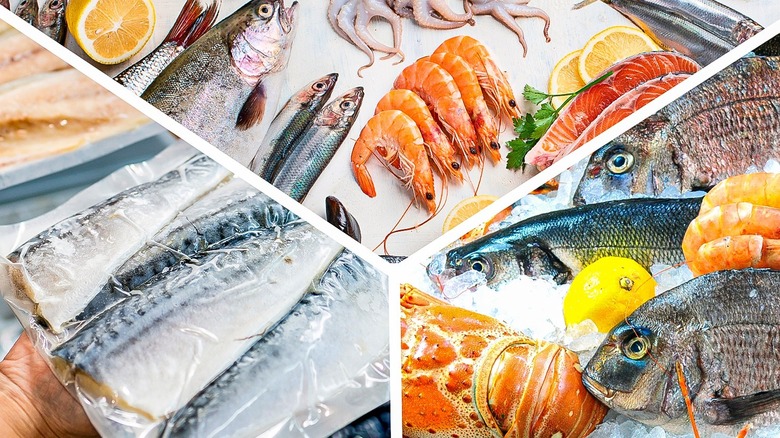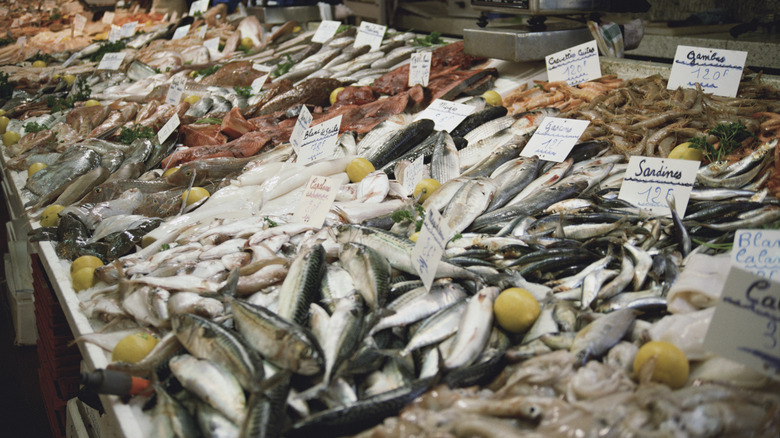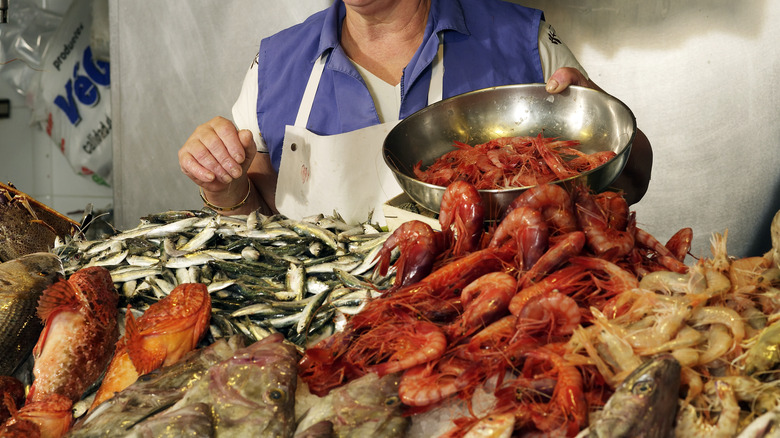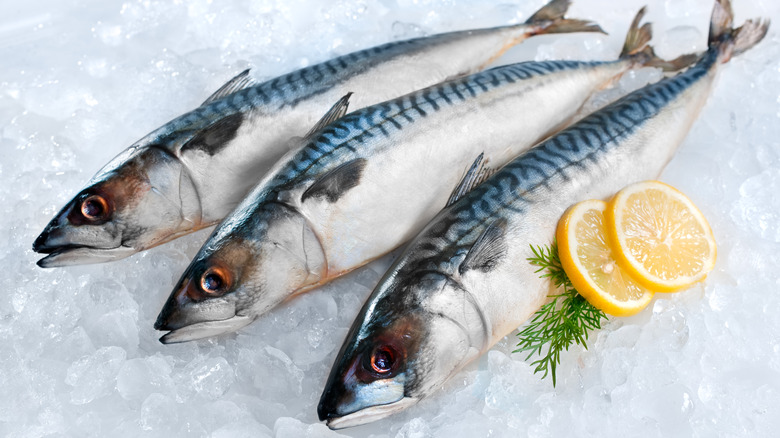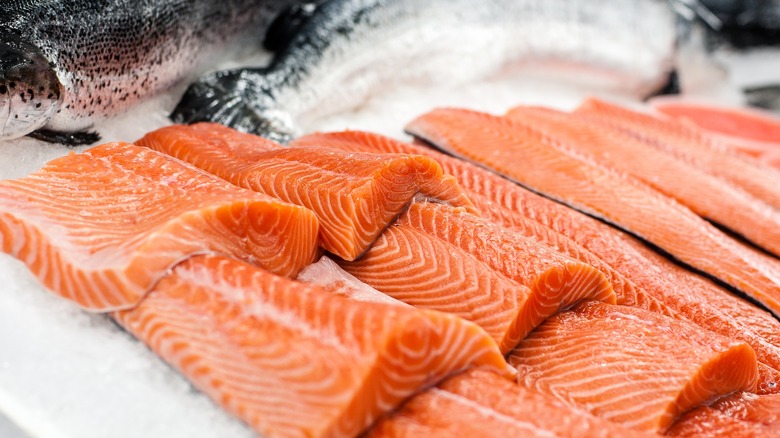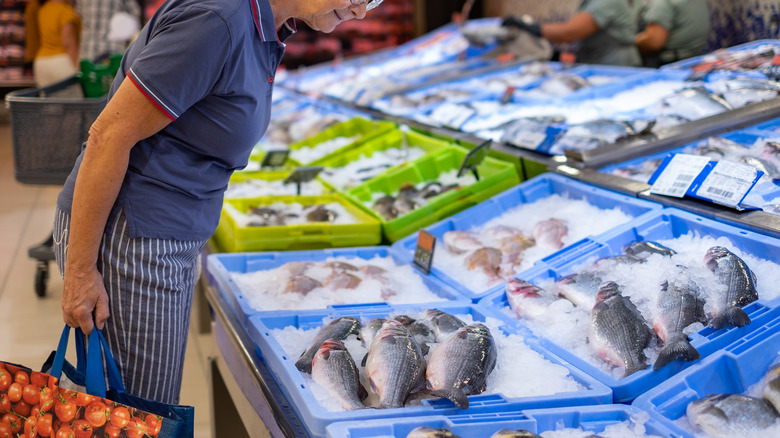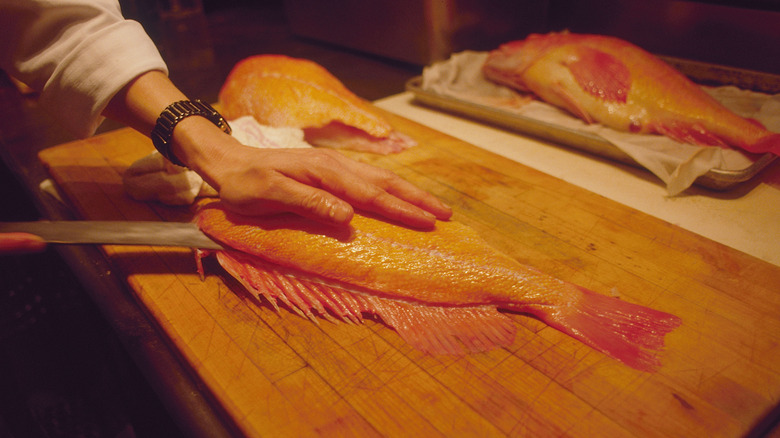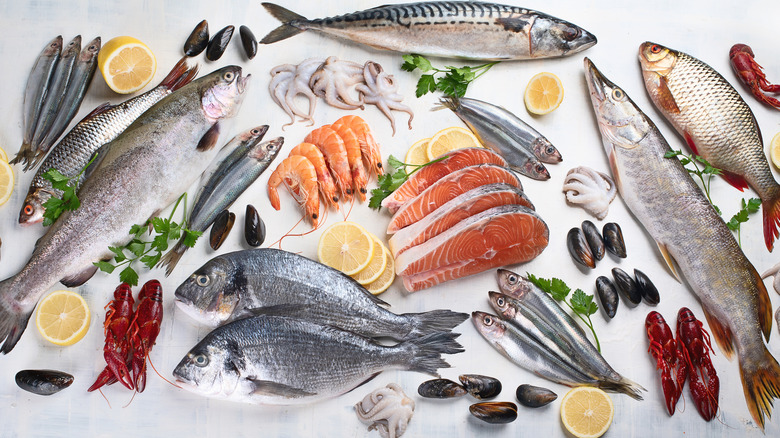The Ultimate Guide To Dos And Don'ts At A Fish Market
There are a lot of reasons people decide to start adding more fish to their diet besides just liking the taste. You might be interested in the benefits from all the lean protein and heart- and brain-healthy omega-3 fatty acids that fish provide. Or maybe you're just looking for a way to add some variety to your meals and expand your culinary horizons. Or, you could be interested in the incredible sustainability that fish provide and the reduced environmental impact brought about by eating fish on a regular basis.
Whatever your reasons for wanting to eat more, you'll likely need to venture beyond your local supermarket's freezer section of fish sticks and popcorn shrimp in order to explore the wealth of fresh fish out there just waiting for a spot on your menu. And that means it's time to plan a trip to your local fish market!
For those of us who don't visit fish markets regularly, shopping for fresh fish can be a wild experience full of unexpected sights, sounds, and especially smells! So many fish. So many weird-looking fish. Tons of people. Mountains of ice. And again — those smells. It's a lot. So before you plan your next trip to this exotic wonderland of sensory overload, make sure you know what you're doing and that you know how to avoid the sort of common mistakes that are hiding all around when you step foot into any fresh fish market.
Do pick a market with a good reputation
If you're planning to buy fresh fish, the reputation of the market you're shopping in is key. A fish market with a good reputation is not only more likely to sell quality seafood at a reasonable cost, but it's also less likely to carry fish that have been caught in unsafe or unsustainable ways or that could possibly even make you sick.
When it comes to high-quality fish markets with incredible reputations, few places compare to the world famous Toyosu Fish Market in Tokyo. Celebrity chef and internet personality Nick DiGiovanni recently got to explore the Toyosu market for the first time, and what he learned there about how the largest fish market in the world operates should be an ideal guideline for how we all select the fish markets we shop at as well.
"Look for cleanliness, a knowledgeable staff, and avoid any place with a strong fishy smell," DiGiovanni said in an exclusive interview with Mashed. "The best fish markets I've been in certainly have a slight odor of the ocean, but [they] lack signs of anything rancid."
Another great clue you're shopping in the right place? Check out the traffic entering and leaving the market. "I also often look for large refrigerated and freezer trucks pulling up to see that they have good turnover (i.e., they're getting fresh seafood often and selling what they bring in) as well as how many people are in the store shopping," he adds.
Do judge the market by your first impression when you walk in
We're always taught as children not to judge a book by its cover, but with fish markets in particular, first impressions are essential, says food and nutrition expert Rima Kleiner, R.D., who is based in Greensboro, North Carolina. Above all, she told Mashed, "look for a market that looks clean inside."
The floors should be dry and free of debris. Display cases should be well maintained and nearly spotless, and the location "should not smell overly 'fishy,'" Kleiner advises. These are great indicators that the owners take hygiene seriously, and the vendors inside are committed to providing a safe and healthy environment for their customers.
Next, take a closer look at the fish being sold — and the variety in particular. A quality fish market should have a wide range of seafood for sale, including both common and more unusual species. The more diverse the inventory, the more likely the market has a good relationship with suppliers and frequently moves through its shipments of fish.
Finally, consider customer service. Is the staff friendly and helpful? Do they greet you as you walk about the market? Are there clearly provided labels detailing the origin of the fish being sold or how it was caught or farmed? The better your experience when you first enter the market, the higher the quality of the fish being sold is likely to be.
Do buy fresh fish based on its appearance
From the freshness of the fish to the quality of the protein, nothing provides more valuable information about the quality of the fish you are buying than its appearance, chef Nick DiGiovanni says. One of the most important things the MasterChef finalist says he learned during his Tokyo fish market experience was just how essential that link between appearance and quality really is. "It sounds odd, but the fish should look healthy," he told Mashed. "The eyes should be nice and round, not all cloudy and shrunken. The gills should have a nice vibrant red color."
Stephen Chavez, a Los Angeles-based chef and instructor at the acclaimed Institute of Culinary Education, agrees that the appearance of any fish is the absolute most important thing to consider when shopping in a fish market. There are certain traits that are signs of good quality when choosing a fish, he says.
"You want to look for the fish to have a firm skin," he says. "When you push on it, it should press back a little bit — it shouldn't totally sink in with your fingerprint. ... You want to make sure that the eyes look clear and ... level, not deeply sunk in, and if they're deeply sunken in, that's an indication as well that it could be old. The fins [should still be] nice and firm, like you couldn't just pull a fin off."
Don't buy fish that smells fishy or has a lot of missing scales
The importance of smell when it comes to shopping for fish cannot be overstated! Fish have a reputation for smelling like ... well, fish. But that's old fish or spoiled fish — the fish you want should smell clean.
"No smell is the best smell" when it comes to buying fish, chef Nick DiGiovanni tells Mashed. "If you walk into a place that reeks of fish, leave. A good fish market will have the clean smell of the ocean. It's never going to smell like roses, but it definitely shouldn't smell bad, either."
High-quality, fresh fish should have a pleasant, clean smell or no smell at all, food and nutrition expert Rima Kleiner agrees. "It's okay if the market has an ocean or briny smell, but you should not be knocked out by odor," she says. If you notice a strong, unpleasant odor when you approach the fish, it is a sign that the fish is not fresh and may be spoiled. Avoid buying fish that smells rancid or rotten, or that has any sort of ammonia, sour, or musty or moldy smell — all of which can indicate potential spoilage. Similarly, any fish you are buying shouldn't have a lot of missing fins or obvious damage to its exterior. "Look for fish that appears fresh and is shiny but not slimy," Kleiner advises. "Fish skin should not be dry, and scales should be fitted, not loose."
Do point out a specific fish you'd like to buy if one catches your eye
You can point out the specific guppy or Siamese fighting fish you want to take home and raise in your aquarium when visiting a pet store. And you should also be able to choose the specific sole, salmon, or flounder you want to take home from the fish market to serve up to your family, our experts say. There's no real difference. If there's a fish you like best for whatever reason, ask the fishmonger working in the market to give you that one.
"You should certainly pick your fish," chef Nick DiGiovanni says. Even in large, busy fish markets, he adds, "it's not uncommon to point to the exact fish you want. I do this at every fish market or grocery store I go to. Once in a while, the fishmonger may give you some pushback or a glare, but it's completely within reason for you to select a particular filet or fish that looks best."
Why not just take the fish the vendor is trying to offer up instead of making a big deal and requesting the fish of your choice, you might wonder? It all comes down to quality! If you want to eat a specific fish, they should give you that fish, he says. "They'll always want to sell out the most mangled or oldest selection they have, so if you don't care, that's what you'll get," DiGiovanni says.
Don't ignore the fishmonger – chat him or her up!
Our experts know a thing or two about cooking fish. Nick DiGiovanni's new cookbook, Knife Drop: Creative Recipes Anyone Can Cook, is out later this summer and is packed with incredible, fish-friendly dishes. Rima Kleiner is a spokesperson for the National Fisheries Institute and blogs at Dish on Fish, where she maintains countless seafood recipes. And Stephen Chavez is an instructor at one of the country's most prestigious culinary schools. And even with all this knowledge, all three say they always spend some time talking to the fishmonger when shopping for fresh fish. And not because they want to make friends, either!
"I always encourage people to ask questions to the ones who handle, raise, catch, or grow our food, and fish is no exception," Kleiner says. "Have a conversation with the fishmonger, and ask about the fish and its origins."
Want to know if the fish you are buying was locally sourced or is in season for your area? "This is something you can and should ask your fishmonger," DiGiovanni says. "They'll be the most knowledgeable ... so there's never any harm in asking for advice."
Most fishmongers should be able to answer a variety of common questions — "Where was the fish caught?" "How fresh is the fish?" "When was it brought to the store?" "What have people been buying the most of?" If they can't or they resist giving you that information, buy your fish elsewhere.
Do ask the fishmonger for preparation advice
If you want to get the most out of the fish you are buying, don't be afraid to ask your local fishmonger for some suggestions on how they would prepare it. After all, your fishmongers are a valuable resource, and they should be able to suggest everything from the best cooking methods to the ideal side dishes to make a spectacular meal with whatever seafood you're buying. "I find that many fishmongers are happy to help provide ideas for preparing and cooking the fish," Rima Kleiner says. Plus, they may suggest something you wouldn't have thought of on your own, she adds. "It's always fun to get new ideas on serving up fish."
Chef Stephen Chavez agrees, adding that their knowledge is especially helpful if you don't know that much about a specific fish or you are just looking for something new to try. "If you don't know what is a good fish for the day, then ask," he says. "If you don't know how to cook it, ask them! You know, that's their job. They're definitely ready to help you with that."
A few great questions to pose:
- Should I leave the skin on or remove it?
- How long should I cook the fish?
- What seasonings or marinades work best with this fish?
The more you learn as you are making your purchase, the better your meal will be!
Don't buy room temperature fish – make sure it is fresh and on ice or has been frozen
When it comes to reducing the risk of foodborne illnesses and preserving nutrients in the fish you buy, the most important thing you should look at is the temperature of the fish. In general, remember that any fish that has been kept at room temperature can be dangerous to your health. Warm temperatures allow harmful bacteria to multiply and can also lead to the rampant growth of foodborne illnesses such as salmonella, listeria, and E. coli. In contrast, buying fish that has been kept on ice since being caught or that has been frozen is always a much healthier option.
Remember that when fish is caught, it starts to deteriorate immediately. Keeping fish on ice or freezing it slows down this process, preserving its quality and freshness. But should you buy chilled or frozen fish? "Go with your preference here," Rima Kleiner advises. "One isn't better than the other."
Still in doubt about the quality of the fish you are thinking of buying? "Use your best judgment!" Nick DiGiovanni cautions. "If your first instinct is that the fish probably isn't fresh, you're probably right! Importantly, develop a relationship with a fishmonger — I have a relationship myself with somebody from every type of food [I buy], including meat, seafood, specialty items, produce. And find out when they get their seafood in each week." That way you'll know it's fresh.
Do ask your fishmonger to filet the fish if you are hesitant about being able to do it at home
There's no humiliation in not being able to filet a fish, whether you just haven't had that much experience in the area or it's a little out of your comfort zone. Even some of the world's best chefs have terrible butchering skills and get other folks to clean and cut their meat and seafood before they prepare it. And if there's no shame in their game, there shouldn't be in yours either.
"Depending on the size of the fish, you can certainly buy a whole one," Nick DiGiovanni says. "And you can most often ask your fishmonger to filet it for you on the spot if you don't want to dirty your kitchen at home or aren't familiar with fileting."
That little step can also be a huge time-saver — fileting is a time-consuming task for most of us. And it's also an easy way to cut yourself and wind up in the hospital emergency room, so having the expert do "the dirty work" can also be a lot safer for the average home cook.
Also, remember that you don't even have to buy the whole fish if you don't want to. Prepared filets are always available and are generally a whole lot more affordable as well. "There's nothing wrong with buying filets themselves," DiGiovanni confirms. "Just remember to point to the ones you want!"
Finally, don't hesitate to try something new!
Whether you're a master chef or a novice, fish markets offer a world of versatility and variety. As the old saying goes, there's always another fish in the sea. And every fish you can buy has a different flavor or texture or can be used in a different way. So don't limit yourself! Don't stick with the same old salmon filet you always buy or your favorite tuna sashimi or the chunk of cod you regularly fry up for Sunday fish and chips. Branch out and try new things. Consider grilling up some branzino or pan-searing a few herb-encrusted rainbow trout. Or make an incredible baked seafood feast with your choice of some incredible fresh arctic char, barramundi, or red snapper.
"Seafood is incredibly healthy and provides numerous health benefits for the heart, brain, body, and eyes," Rima Kleiner reminds us. "[Experts] recommend eating seafood at least two to three times each week to meet nutrient needs. And I find that many people eat the same kinds of seafood."
Sound familiar? It's fine to stick with your favorite, she says, but don't be afraid to branch out and try new things either — especially when you are in a fish market surrounded by options. "There are so many species and ways to prepare the different species that I encourage people to try different kinds of fish and different ways to prepare it," she says. Your taste buds will thank you!
